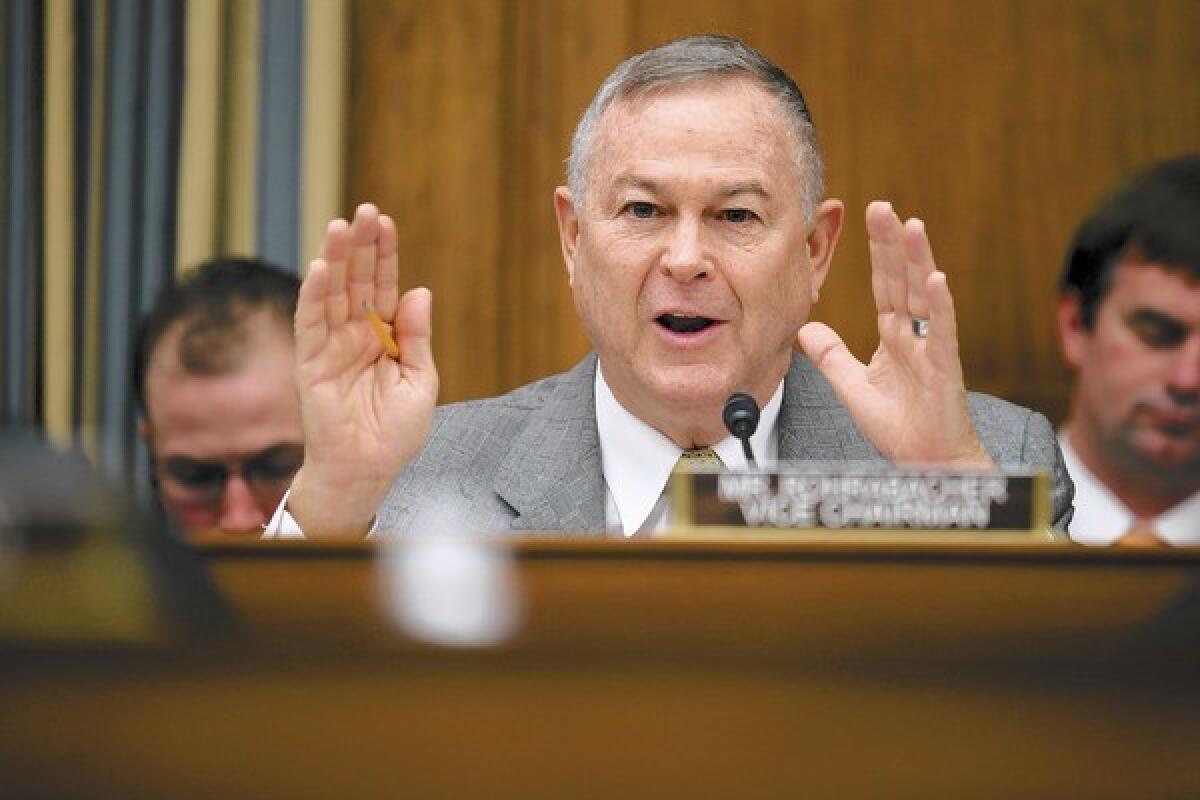Nine Californians in Congress vote against House budget deal

- Share via
WASHINGTON — Reps. Dana Rohrabacher, an Orange County conservative, and Maxine Waters, a Los Angeles liberal, on the same side of an issue?
The Ripley’s Believe It or Not moment came Thursday in a House vote to pass a budget deal designed to prevent another government shutdown.
The vote scrambled the usual alliances within California’s congressional delegation, with nine of the state’s 53 House members — seven Democrats and two Republicans — voting against the agreement.
Democrats who voted no were upset that the budget deal did not extend federal unemployment benefits for an estimated 214,800 Californians whose benefits expire after Christmas.
“I cannot support a budget that leaves 1.3 million Americans in the cold this holiday season,” said Rep. Judy Chu (D-Monterey Park).
“This is a real problem in places like my district, where the unemployment rate remains at nearly 7.5%, and the city where I live, Santa Ana, is as high as 9.4%,” added Rep. Loretta Sanchez (D-Santa Ana), who also voted against the agreement.
The other California Democrats voting no were Sanchez’s sister, Linda T. Sanchez of Whittier, as well as Gloria Negrete McLeod of Chino, Barbara Lee of Oakland, Karen Bass of Los Angeles and Waters. Among the state’s Republicans, Rohrabacher was joined by Rep. Tom McClintock of Elk Grove in voting against the agreement.
Republicans said the budget deal wouldn’t do enough to reduce Washington’s red ink. McClintock called it “a mistake at a time when we can’t afford many more mistakes.”
Lawmakers who voted for the measure expressed relief that members of opposing parties could come together on anything in this hyper-partisan Congress, expressing hope that it could help prevent more of the kind of showdowns that led to October’s 16-day partial government shutdown and further tarnished Congress’ image.
“This deal is far from perfect, but it is a positive step toward enacting a long-term budget solution and putting an end to governing in a crisis environment,” said Rep. Grace F. Napolitano (D-Norwalk).
Several Democrats said that they, too, were unhappy that the budget deal didn’t extend jobless benefits, but that they voted for it anyway.
Rep. Tony Cardenas (D-Los Angeles) said he was “holding my nose” as he cast his vote.
“What’s the alternative?” said Rep. John Garamendi (D-Walnut Grove).
“I’m not really happy with it,” said Rep. Henry A. Waxman (D-Beverly Hills). But he added, “It’s either that or nothing.”
House Democratic Leader Nancy Pelosi of San Francisco said at a news conference that she too was unhappy about the omission of extended jobless aid, “but not enough to say, ‘Therefore, we’re going to make matters worse by not having an agreement.’”
Rep. Howard “Buck” McKeon (R-Santa Clarita), chairman of the House Armed Services Committee, supported the measure, which would fulfill his goal of reducing spending cuts to the Pentagon. Still, he expressed concern that the defense spending levels remain “insufficient to meet future national security challenges.”
Democratic Reps. Eric Swalwell of Dublin and Scott Peters of San Diego and Republican David G. Valadao of Hanford, all Californians and freshman members of the United Solutions Caucus, said in a statement that the agreement would provide “certainty about federal spending” while reducing the deficit.
The $85-billion budget deal, approved by the House, 332 to 94, replaces another round of automatic across-the-board spending cuts that was to take effect in January, including cuts to the Pentagon, with different measures to raise or save money. They include requiring newly hired federal workers to contribute more to their pensions, reducing the cost-of-living adjustment for military retirees under age 62 and increasing fees on air travel.
Rep. Brad Sherman (D-Sherman Oaks) called the budget deal an “imperfect compromise” but voted for it, noting that it is bipartisan and reduces the risk of another government shutdown.
More to Read
Sign up for Essential California
The most important California stories and recommendations in your inbox every morning.
You may occasionally receive promotional content from the Los Angeles Times.











